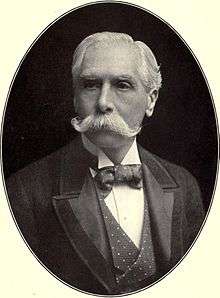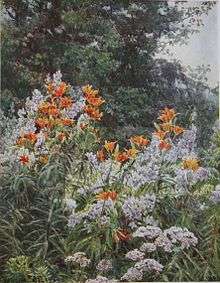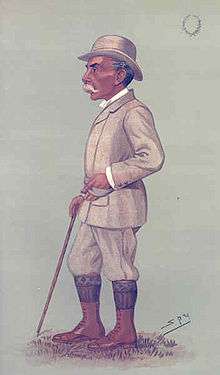Alfred Austin
| Alfred Austin | |
|---|---|
 Alfred Austin, by Langfier, 1900. | |
| Born |
30 May 1835 Headingley, Yorkshire, England |
| Died |
2 June 1913 (aged 78) Ashford, Kent, England |
| Occupation | Poet, novelist, dramatist |
| Nationality | English |
Alfred Austin DL (30 May 1835 – 2 June 1913) was an English poet who was appointed Poet Laureate in 1896, after an interval following the death of Tennyson, when the other candidates had either caused controversy or refused the honour. It was claimed that he was being rewarded for his support for the Conservative leader Lord Salisbury in the General Election of 1895. Austin’s poems are little-remembered today, his most popular work being prose idylls celebrating nature.
Life
Alfred Austin was born in Headingley, near Leeds, on 30 May 1835, to a Roman Catholic family. His father, Joseph Austin, was a merchant in Leeds; his mother was a sister of Joseph Locke, the civil engineer and M.P. for Honiton. Austin was educated at Stonyhurst College (Clitheroe, Lancashire), St Mary's College, Oscott,[1] and University of London, from which he graduated in 1853.[2] He became a barrister in 1857 but after inheriting a fortune from his uncle gave up his legal career for literature.[2][3][4]
Politically conservative, between 1866 and 1896 Austin edited National Review and wrote leading articles for The Standard.[2] He was Foreign Affairs Correspondent with the Standard, and served as a special correspondent to The Ecumenical Council of the Vatican in 1870; at the Headquarters of the King of Prussia during the Franco-Prussian War, 1870; at the Congress of Berlin, 1878 where he was granted an audience by German Chancellor Otto von Bismarck. An ardent imperialist and follower of Disraeli he became, in 1883, joint editor of the National Review with W.J. Courthope and was sole editor from 1887 until 1896.[3]
On Tennyson's death in 1892 it was felt that none of the then living poets, except Algernon Charles Swinburne or William Morris, who were outside consideration on other grounds, was of sufficient distinction to succeed to the laurel crown, and for several years no new poet-laureate was nominated. In the interval the claims of one writer and another were assessed,[5] but eventually, in 1896, Austin was appointed to the post[2] after Morris had declined it. As a poet Austin never ranked highly in the opinions of his peers, and was often derided as being a ‘Banjo Byron’
Broadus writes that the choice of Austin for poet-laureate had much to do with Austin's friendship with Lord Salisbury, his position as an editor and leader writer, and his willingness to use his poetry to support the government.[6] For example, shortly before his appointment was announced, Austin published a sonnet entitled A Vindication of England, written in response to a series of sonnets by William Watson, published in the Westminster Gazette, that had accused Salisbury's government of betraying Armenia and abandoning its people to Turkish massacres.[7]
Sir Owen Seaman (1861–1936) gave added currency to the supposed connection with Lord Salisbury in his poem, 'To Mr Alfred Austin', In Cap and Bells, London & New York, 1900, 9:
'At length a callous Tory chief arose,
Master of caustic jest and cynic gibe,
Looked round the Carlton Club and lightly chose
Its leading scribe.'
Austin served as Deputy-Lieutenant for Herefordshire. Austin died of unknown causes at Swinford Old Manor,[8] Hothfield, near Ashford, Kent, England, where he had been ill for some time.[9]
Family

On 14 November 1865 Austin married Hester Jane Homan-Mulock, tenth child of Thomas Homan-Mulock and Frances Sophia Berry at St Marylebone Parish Church, London. In his Autobiography, Austin gives a curious account of their first meeting with her. Seeing the photograph of a young lady in an album belonging to a friend in Florence, he had asked: ‘Who is that?’ and received the reply, ‘The girl you ought to marry, if you can.’ Austin brought home a letter of introduction, the presentation of which led to his receiving at his cottage in Hertfordshire two of the Misses Mulock and their chaperon, together with their friend T.A. Trollope, brother of Anthony Trollope. At the second visit Hester became engaged to Alfred. Throughout his career as journalist and writer Austin derived constant help and support from his wife. She died suddenly on 23 September 1929 at her residence in Kensington. His nephews included the Polar Explorer Captain George F.A. Mulock and British diplomat Sir Howard William Kennard (1878–1955), British Ambassador to Poland at the outbreak of the Second World War.
Poetry
In 1861, after two false starts in poetry and fiction, he made his first noteworthy appearance as a writer with The Season: a Satire, which contained incisive lines, and was marked by some promise both in wit and observation. In 1870 he published a volume of criticism, The Poetry of the Period, which was conceived in the spirit of satire, and attacked Tennyson, Browning, Matthew Arnold and Swinburne in an unrestrained fashion. The book aroused some discussion at the time, but its judgments were extremely uncritical.[2]
As poet-laureate, his topical verses did not escape negative criticism; a hasty poem written in praise of the Jameson Raid in 1896 being a notable instance. The most effective characteristic of Austin's poetry, as of the best of his prose, was a genuine and intimate love of nature. His prose idylls, The Garden that I love and In Veronica's Garden, are full of a pleasant, open-air flavour. His lyrical poems are wanting in spontaneity and individuality, but many of them possess a simple, orderly charm, as of an English country lane. He had, indeed, a true love of England, sometimes not without a suspicion of insularity, but always fresh and ingenuous. A drama by him, Flodden Field, was performed at His Majesty's theatre in 1903,[2] with incidental music by Percy Pitt. A number of his poems were set to music by Frances Allitsen,[10] and Alexander Mackenzie's contribution to Choral Songs in Honour of Her Majesty Queen Victoria (1899) was a setting of Austin's occasional poem With wisdom, goodness, grace.
Bibliography

Novels
- (1858). Five Years of It. London: J.F. Hope (2 vols) Volume 1 · Volume 2
- (1864). An Artist's Proof, London: Tinsley (3 vols) Volume 1 · Volume 2 · Volume 3
- (1866). Won by a Head. London: Chapman & Hall (3 vols) Volume 1 · Volume 2 · Volume 3
Poetry
- (1855). Randolph: A Poem in Two Cantos. London: Saunders & Otley. Revised edition published as Leszko the Bastard: A Tale of Polish Grief (1877), London: Chapman & Hall
- (1861). The Season: A Satire, London: Hardwicke. Revised edition (1861), London: George Manwaring; new revised edition (1869), London: Hotten
- (1861). My Satire and its Censors. London: George Manwaring
- (1862). The Human Tragedy: A Poem, London: Hardwicke. Revised edition (1876), Edinburgh: Blackwood; new revised edition (1889), London: Macmillan
- (1871). The Golden Age: A Satire. London: Chapman & Hall.
- (1872). Interludes. Edinburgh and London: Blackwood
- (1873). Rome or Death!. Edinburgh and London: Blackwood
- (1882). Soliloquies in Song. London: Macmillan
- (1885). At the Gate of the Convent and Other Poems. London: Macmillan
- (1889). Love's Widowhood and Other Poems. London: Macmillan
- (1891). Lyrical Poems. London & New York: Macmillan
- (1891). Narrative Poems. London & New York: Macmillan. 2nd edition (1896)
- (1895). Madonna's Child . London: Macmillan
- (1897). The Conversion of Winckelmann and Other Poems. London: Macmillan
- (1900). Songs of England. London: Macmillan
- (1902). A Tale of True Love and Other Poems. London: Macmillan, New York: Harper
- (1906). The Door of Humility. London: Macmillan
- (1908). Sacred and Profane Love and Other Poems. London: Macmillan
Drama
- (1874). The Tower of Babel: A Poetical Drama. Edinburgh: Blackwood
- (1881). Savonarola: A Tragedy. London: Macmillan
- (1887). Prince Lucifer. London: Macmillan; 3rd edition (1891).
- (1892). Fortunatus the Pessimist: A Dramatic Poem London & New York: Macmillan
- (1896). England's Darling London & New York: Macmillan. Republished as Alfred the Great: England's Darling (1901). London: Macmillan .
- (1903). Flodden Field: A Tragedy. London: Macmillan
- (1904). A Lesson in Harmony. London and New York: Samuel French
Other
- (1869). A Vindication of Lord Byron. London: Chapman & Hall
- (1870). The Poetry of the Period. London: Richard Bentley
- (1885). Skeletons at the Feast. Or, The Radical Programme. London: W. H. Allen
- (1894). The Garden that I Love. London & New York: Macmillan
- (1895). In Veronica's Garden. London & New York: Macmillan
- (1898). Lamia's Winter-Quarters. London: Macmillan
- (1902). Haunts of Ancient Peace. London & New York: Macmillan; London: A. & C. Black
- (1904). The Poet's Diary. London: Macmillan
- (1904). An Eighteenth Century Anthology. London: Blackie
- (1910). The Bridling of Pegasus: Prose Papers on Poetry. London: Macmillan
- (1911). The Autobiography of Alfred Austin, Poet Laureate, 1835–1910. London: Macmillan (2 vols) - Volume 1 · Volume 2
Trivia
Austin was caricatured as "Sir Austed Alfrin" by L. Frank Baum in his 1906 novel John Dough and the Cherub.
He was also the subject of a Vanity Fair cartoon by Spy published on 20 February 1896.
A Poem – To England
| |
| |
|
Now upon English soil I soon shall stand, | |
Notes
- ↑ "Austin, Alfred". Who's Who. 59: 66. 1907.
- 1 2 3 4 5 6 Encyclopædia Britannica, 1911
- 1 2 The Oxford Companion to English Literature, 6th Edition. Edited by Margaret Drabble, Oxford University Press, 2000, p 53
- ↑
 Foster, Joseph (1885). "Austin, Alfred". Men-at-the-Bar (second ed.). London: Hazell, Watson, and Viney. p. 15.
Foster, Joseph (1885). "Austin, Alfred". Men-at-the-Bar (second ed.). London: Hazell, Watson, and Viney. p. 15. - ↑ By, for example, the theatre critic Joseph Knight and others in The Idler: see Francis, John Collins (1909). "
 Joseph Knight".
Joseph Knight".  Notes by the Way with Memoirs of Joseph Knight, F.S.A.. London: T. Fisher Unwin. Wikisource.
Notes by the Way with Memoirs of Joseph Knight, F.S.A.. London: T. Fisher Unwin. Wikisource.  pp. xxix-xxx.
pp. xxix-xxx.  [scan]
[scan] - ↑ Edmund Kemper Broadus, The Laureateship, A Study Of The Office Of Poet Laureate In England With Some Account Of The Poets, Oxford: Clarendon Press, 1921, p. 203.
- ↑ William Watson, The Purple East, A Series Of Sonnets On England's Desertion of Armenia, London, 1896, pp. 7-8.
- ↑ Photo at "Swinford Manor, 1901". Retrieved 1 May 2016.
- ↑ "British Laureate, Alfred Austin, dies". New York Times. 3 June 1913. Retrieved 1 May 2016.
- ↑ "Alfred Austin (1835-1913)". The LiederNet Archive. Retrieved 1 May 2016.
- ↑ Alfred Austin, from Songs of England
References
- The autobiography of Alfred Austin, poet laureate, 1835 – 1910; (ISBN 0-404-08717-5)
- The Story of Mulock: The Pedigree of the Mulock Family of Ireland by Sir Edmund Thomas Bewley (Ponsonby & Gibbs, 1905)
- By Virtue & Faith: A History of the Mulock & Mullock Families by Robert Hughes-Mullock FRAS (2012)
External links
| Wikimedia Commons has media related to Alfred Austin. |
| Wikiquote has quotations related to: Alfred Austin |
| Wikisource has original works written by or about: Alfred Austin |
- Works by Alfred Austin at Project Gutenberg
- Works by or about Alfred Austin at Internet Archive
- Works by Alfred Austin at LibriVox (public domain audiobooks)

- "Archival material relating to Alfred Austin". UK National Archives.
- Alfred Austin Papers, 1869–1902 (5 linear ft.) housed in the Department of Special Collections and University Archives at Stanford University Libraries
- Mulock Family Tree "The Irish Bomfords 1617 to the Present". Retrieved 8 December 2010.
| Court offices | ||
|---|---|---|
| Preceded by Alfred, Lord Tennyson |
British Poet Laureate 1892–1913 |
Succeeded by Robert Bridges |